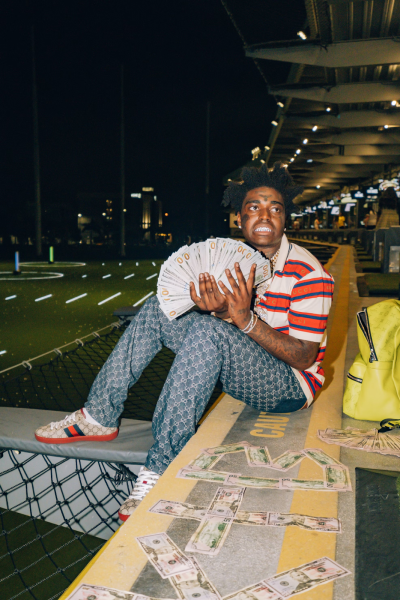“Hey, I like your shoes. How much were they?”
When we see a fancy piece of clothing, one of the first things to consider is the rather hefty price tag that goes with it. In a world that puts so much emphasis on cost, our perception of clothes is no different. Therefore, some clothing has become a status symbol, costing more than it is worth.
One major example of inflated prices is sneakers. Exclusive pairs of Nike and Air Jordan sneakers often sell for hundreds of dollars, with some even passing the thousand-dollar mark. These sneakers are manufactured in purposefully small batches to create a sense of exclusivity and justify these absurd costs.
Many clothing brands are also popular for their exclusivity, such as Gucci and Louis Vuitton, who are notable for their unique brand recognition and status. Celebrities such as rapper Kodak Black can be seen sporting outfits composed solely of Gucci, with jeans costing over $1,000 alone.

The issue with putting these pieces of streetwear on a ‘pedestal’ is that the resale price makes the shoes inaccessible, giving them even more value. This exclusivity has forced many to turn to a new source for their clothing, China.
Chinese sellers offer knockoffs of high-demand pieces for a fraction of the price. These counterfeiting operations can vary in size and scale, but their main production method is the same — reverse engineering expensive goods by looking at photos and models and figuring out the design process. While quality can vary based on the scale of the operation, most counterfeits that enter the market manage to match at least some details of the original product.
Brand sneakers that would have cost over $1,000 on the resale market can be found for about $50 as a knockoff. While even high-end counterfeits are not perfect replicas of their real counterparts, they come incredibly close. In some cases, these sellers might have an even higher quality control standard than the official manufacturer. Products such as Nike dunks have notoriously bad quality control, with genuine products being made up of cheap leather and sloppy stitching. For this reason, some replica makers tend to overdo it when it comes to making knockoffs.
While counterfeiters face their own difficulties when it comes to matching the material and feel of a product, consumers also find themselves locked out of this market due to its location. For the most part, sellers are only listed on Chinese marketplaces such as Taobao or Weidian. These sites are usually in Chinese and refuse international shipping.
Due to restrictions that block out most U.S. customers, third-party ‘agent’ sites have popped up to help foreigners navigate the purchasing process. The most prominent of these sites is Pandabuy, a Chinese-run site that catalogs these items and makes purchasing these goods feasible for foreigners. This is done by directly buying the desired items from the Chinese sellers and shipping them to one of their warehouses. The customer has the freedom to choose how they want their items shipped. From there, they simply have to pay for the shipping fee and the cost of the goods.
This simple process allows many people to access Chinese manufacturers and obtain high-demand items at a fair price. While this may seem like a fair solution, it is controversial to many.
Knockoffs are frowned upon in many sneaker and fashion communities. People who are against ‘reps’ – short for replica clothing – argue that the illegitimacy of the item takes away from what makes the true forms special. Many people also frown on these knockoffs simply because they are knockoffs.
However, there is a growing movement in favor of these knockoff goods and their value in fashion culture. In fact, many rep communities that embrace these goods have sprung up and are thriving on various social media platforms, such as Reddit and TikTok. These communities have a different perspective, primarily centered around reviewing replica items, sharing tips and tricks, and even helping each other find the best deals on high-quality replicas.
Reddit, an online platform that lets users create forums for whatever topic they choose, has become a hub for these positive rep communities. User-created forums on Reddit, such as r/FashionReps and r/RepSneakers, have thousands of members who are passionate about discussing and sharing their experiences with replica clothing and sneakers. These communities provide a space for individuals to exchange information about where to find the best replicas, how to identify high-quality items, and how to avoid scams.
One of the key principles of these communities is transparency. Members openly acknowledge that they are buying replicas and don’t try to pass them off as authentic. Instead, they appreciate replica items for what they are, affordable alternatives to high-end designer clothing and sneakers. As long as these groups stay honest, they are usually well-respected, even by those who typically frown upon reps.
However, the real issue arises when people try to sell knockoffs and pass them off as legitimate. This has become a major problem in this era of digital shopping, where buyers cannot physically inspect the item before buying.
The selling of knockoffs usually occurs on popular online marketplaces such as StockX or eBay, where the issue has become pressing in recent years. This phenomenon poses significant challenges, both for unsuspecting buyers who may receive counterfeit items and for the platforms themselves, which aim to maintain their integrity and reputation as trusted online marketplaces. To address these concerns, these platforms have adopted several strategies and measures aimed at safeguarding buyers and preventing the sale of replicas as authentic products.
First, these sites rely on rigorous authentication processes through which all ‘high-risk’ items must go. These include, but are not limited to, exclusive sneakers, designer hoodies and jackets, wallets and bags, and pieces of jewelry such as necklaces and bracelets.
Another strategy these sites have adopted is seller requirements. In this, screenings are usually a requirement before listing a high-value item, and sites look at seller history to ensure that they have a somewhat decent reputation before listing any goods. They also ban sellers who attempt to circumvent these requirements, and the requirement of a photo I.D. to become a trusted seller makes it much harder for scammers to set up shop under a new alias.
Online marketplaces are not the only organizations waging a war on counterfeit goods. U.S. federal agencies are also joining the battle to protect the U.S. economy from these Chinese manufacturers.
U.S. Customs and Border Protection (CBP) is the first line of defense against knockoffs, playing a critical role in intercepting and seizing items they believe will enter the economy. According to Jessica Turner, A CBP representative, in Fiscal Year 2023, CBP made nearly 20,000 Intellectual Property Rights (IPR)-related seizures, which amounted to a staggering 23.2 million counterfeit items. These seizures, had they been authentic, would have held a combined Manufacturer’s Suggested Retail Price (MSRP) of over $2.8 billion.
While these numbers highlight the magnitude of the issue, it’s also essential to note that there has been a slight decrease in IPR-related seizures compared to the previous fiscal year. In FY22, CBP made nearly 21,000 seizures, totaling 24.8 million counterfeit items, with a cumulative MSRP of $2.9 billion. This indicates that despite the relentless efforts to combat counterfeit trade, the problem persists.
The main issue with this battle is that it affects communities that have done nothing wrong and are trying to access a market that is inaccessible to them due to manufactured exclusivity. These communities are honest about the origins of their goods and focus on sharing their opinions on replicas or showcasing the importance of personal style over brand names. However, many people who own knockoffs are often stigmatized and, therefore, tend to lie about the origins of these goods. This act of self-preservation has the adverse effect of breaking down the honesty and transparency that make these communities so respectable in the first place.
However, sites like eBay and StockX are not in the wrong either. These sites are fundamentally at a higher risk and need to take extra precautions to ensure the safety of their buyers. Without these tight restrictions, the market would be flooded with counterfeit goods, and an entire subculture of fashion would be decimated.
No matter what happens, many people will be upset with the outcome. Whether replicas become commonplace or are removed altogether, many people will feel shut out from this streetwear subculture. All that can be done is to ensure the transparency of goods sold on third-party marketplaces and protect buyers from illegitimate items. Other than that, counterfeiters will constantly be stuck in a cat-and-mouse game with customs who protect the interests of businesses and consumers who want to own exclusive fashion pieces.
One of the key principles of these communities is transparency. Members openly acknowledge that they are buying replicas and don’t try to pass them off as authentic. Instead, they appreciate replica items for what they are, affordable alternatives to high-end designer clothing and sneakers. As long as these groups stay honest, they are usually well-respected, even by those who typically frown upon reps.

